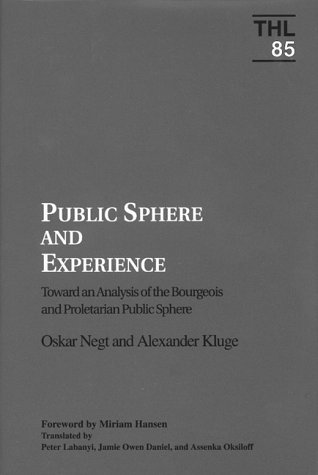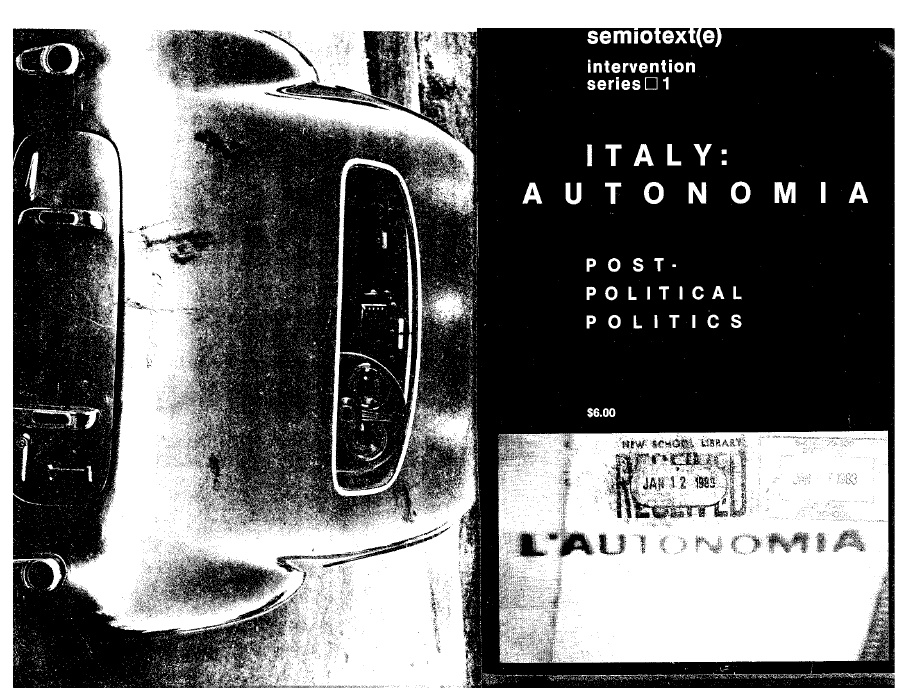Oskar Negt, Alexander Kluge: Public Sphere and Experience: Toward an Analysis of the Bourgeois and Proletarian Public Sphere (1972–)
Filed under book | Tags: · capitalism, mass media, politics, proletariat, public sphere, technology, television

“The ‘public sphere’ is widely debated in contemporary literary and cultural studies circles in the United States. The topic’s significance underscores the pressing problem of the location of these contemporary debates: Is the ‘public sphere’ a single authoritative and universal space in which the various positions in these debates compete for recognition, or does it consist of multiple local spaces spread over diverse collectivities? The term ‘public’ has emerged with new urgency in different disciplines and contexts history, cinema and television studies, art criticism, feminist, gay and lesbian, postcolonial, and subaltern perspectives, and is proliferating in titles of books, articles, and college courses. Public Sphere and Experience opens the discussion of the material conditions of experience into an arena that had previously figured only as an abstract term: the media of mass and consumer culture, in particular the so-called new media.”
Originally published as Öffentlichkeit und Erfahrung: Zur Organisationsanalyse von bürgerlicher und proletarischer Öffentlichkeit, 1972, Suhrkamp Verlag, Frankfurt
Translated by Peter Labanyi, Jamie Owen Daniel, and Assenka Oksiloff
Foreword by Miriam Hansen
Publisher University of Minnesota Press, 1993
Theory and History of Literature series, 85
ISBN 0816620318, 9780816620319
305 pages
PDF (7 MB)
Comment (1)Semiotext(e) 3(3): Autonomia: Post-Political Politics (1980)
Filed under magazine | Tags: · autonomy, italy, politics, proletariat, protest, social movements, society, work

“Semiotext(e)’s legendary magazine issue Italy: Autonomia: Post-Political Politics. Edited by Sylvère Lotringer and Christian Marazzi with the direct participation of the main leaders and theorists of the Autonomist movement (including Antonio Negri, Mario Tronti, Franco Piperno, Oreste Scalzone, Paolo Virno, Sergio Bologna, and Franco Berardi), this volume is the only first-hand document and contemporaneous analysis that exists of the most innovative post-’68 radical movement in the West. The movement itself was broken when Autonomia members were falsely accused of (and prosecuted for) being the intellectual masterminds of the Red Brigades; but even after the end of Autonomia, this magazine remains a crucial testimony of the way this creative, futuristic, neo-anarchistic, postideological, and nonrepresentative political movement of young workers and intellectuals anticipated issues that are now confronting us in the wake of Empire.”
Edited by Sylvère Lotringer and Christian Marazzi
Publisher Semiotext(e), New York
Intervention series, 1 / Foreign Agents series
ISSN 1584350539, 9781584350538
xvi+300 pages
via Stevphen Shukaitis
PDF (8 MB, updated on 2017-6-26)
Comment (0)Michael T. Taussig: The Devil and Commodity Fetishism in South America (1980/2010)
Filed under book | Tags: · anthropology, capitalism, commodity fetishism, economics, production, proletariat, south america, theory of value

In this classic book, Michael Taussig explores the social significance of the devil in the folklore of contemporary plantation workers and miners in South America. Grounding his analysis in Marxist theory, Taussig finds that the fetishization of evil, in the image of the devil, mediates the conflict between precapitalist and capitalist modes of objectifying the human condition. He links traditional narratives of the devil-pact, in which the soul is bartered for illusory or transitory power, with the way in which production in capitalist economies causes workers to become alienated from the commodities they produce. A new chapter for this anniversary edition features a discussion of Walter Benjamin and Georges Bataille that extends Taussig’s ideas about the devil-pact metaphor.
30th Anniversary Edition
With a new chapter by the author
Publisher University of North Carolina Press, 2010
ISBN 0807871338, 9780807871331
296 pages

